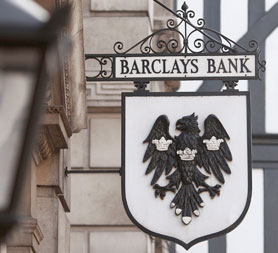Barclays cuts bonuses as profits rise to £6.1bn
Banking giant Barclays reports pre-tax profits of £6.1bn for 2010 and reduces bonus payments, but former City boy Geraint Anderson tells Channel 4 News the system has not changed too much.

Barclays bank today posted a 32 per cent rise in pre-tax profits of £6.1bn, slightly higher than analysts expected.
The bank said that following its “Project Merlin” deal with the Government, it will pay 7 per cent less in performance awards than last year.
At its investment banking arm Barclays Capital, which saw pre-tax profits excluding own credit increase by 2 per cent to £4.4bn, the bonus pool will be 12 per cent lower than last year.
Despite the reduction in the bonus pool, overall remuneration to staff increased 20 per cent to £11.9bn. Total performance-related pay, including bonuses which had been deferred from previous years, increased by 25 per cent to £3.5bn.
Barclays also announced a raft of new measures which will see senior staff bonuses deferred over three years and will only be paid if the bank meets its capital requirements under the Basel agreement.
'The system encourages short term reckless gambling'
Former City analyst Geraint Anderson, alias Cityboy, wrote an anonymous column exposing the inner workings of the City before leaving his job and writing Cityboy: Beer and Loathing in the Square Mile. He told Channel 4 News that the system encouraged reckless gambling - and still does.
"It has changed a little," he said. "You used to get the majority of your bonus in cash, but now some is deferred. Most people get 20 or 30 per cent in cash and the rest deferred, and in equity [shares]. The problem is that the two banks that had the highest proportion of equity owned by their employees were Lehmans and Bear Stearns. These two banks took by far the biggest risks. So giving bonuses in equity had no impact on their behaviour."
He said the bonus system encourages rational people to bet - particularly the competitive people in the City who talk about bonuses "all the time" and see them as a measure of the person they are.
"If I make bets and they come good, I get some of that in my bonus. If I lose huge amounts of money, nothing is taken from my pocket. And if you combine that with the fact that you are betting with someone else's money - and we were told continually that the party was going to be over soon - it encourages short term reckless gambling. It's like being handed a lot of money, sent to a casino and told, if it comes good, you can keep the money. If not, don't worry. And then they add that the casino is about to close. The only rational way is to put it all on black.
"And if you are clever, you can make it look like you have made huge profits using dodgy financial products - by the time they find out it's too late, you've already had your bonus. This pretty much explains how the credit crunch happened."
He said public anger over bonuses was "totally understandable - it's outrageous."
"The banks wouldn't exist if they hadn't been bailed out. And now the banks to some extent are profiting because of the crisis they created. For example interest rates are near zero. It's very easy for banks to make money lending at higher rates than that. People recognise that the bonus system encourages reckless gambling, which led to the credit crunch. By perpetuating the system which got us into this trouble, people are aware there could be another crash...the banks know they have unofficial insurance from the Government. Unlike any other industry, they know that they can take high profit, high risk gambles safe in the knowledge they will be bailed out.
"It's very hard to see how this will change - there's a powerful lobbying machine. As we saw, 50 per cent of donations to the Conservatives come from the City or City individuals. It is tough to change a system when there is so much elite, privileged vested interest in keeping it the same."
Geraint Anderson, alias Cityboy, is a former City worker and has written Cityboy: Beer and Loathing in the Square Mile, about his experiences.
Project Merlin
The number of staff who will see 60 per cent of their pay deferred has also been significantly expanded beyond the requirements of the FSA’s remuneration code, the company added.
Chief executive Bob Diamond is due to receive an expected package of more than £9m in pay and bonuses but details are unlikely to be revealed until Barclays releases its annual report next month.
Barclays said its decision to reduce 2010 bonuses was influenced by its recent Project Merlin agreement with the Government which saw the big four banks agree to pay less in bonuses than last year and lend more to small businesses.
“We are committed to demonstrating that we are both responsible in our compensation decisions and practices and that we take our regulatory obligations and UK Government commitments seriously,” Mr Diamond said.
“In particular, our overall performance awards in 2010 have been directly influenced by the commitments that we have made under Project Merlin.
“In reaching our final decisions, we have had to balance carefully our obligations with our need to ensure that our decisions are commercial in a highly competitive global environment.”